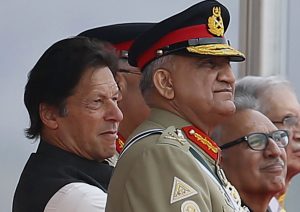The Pakistani government has decided to file a review petition challenging the Supreme Court’s verdict in the Army Chief’s extension judgment. Recently, the country’s highest court asked in its verdict that the government to carry out a constitutional amendment to rectify the confusion surrounding the issue.
It’s important to note that Pakistan’s constitution doesn’t clearly define rules and circumstances which could be used as a motivation to offer a second tenure to the Army chief. The government’s decision to file a review petition demonstrates the nature of existing violent politics in Pakistan and what is expected to happen in the coming weeks when it comes to the interaction of various state institutions.
Pakistan’s Tehreek-e-Insaaf (PTI) government continues to exert pressure on opposition parties. During the last week alone, two senior members of the Pakistan Muslim League – Nawaz (PML-N), the main opposition party, were arrested by the National Accountability Bureau (NAB) on corruption charges. Moreover, the government has refused to remove Maryam Nawaz’s name from the Exit Control List (ECL), preventing her from traveling abroad. The government’s pressure on other political parties has also picked up over the last two weeks with the former promising to go after corrupt politicians.
These developments show that contrary to assertions that the government will consider working with the opposition parties to gain support for the constitutional amendment in the Army Chief’s case, the former has only increased pressure. This policy on the part of the government shows two things. First, the PTI lead government in Pakistan doesn’t want to offer any political space to the opposition. It’s understood that obtaining the opposition’s support in the Army Chief’s extension issue will require serious concessions from the government which could also include dropping all cases against the opposition and making an announcement for fresh polls in the coming months. All opposition political parties in Pakistan have asked for fresh polls as they consider the current government the result of rigging and political engineering.
Second, it’s probable that the opposition is in no mood to strike a compromise with the government over the Army chief’s extension. This is another likely scenario. The head of the Jamiat Ulema-i-Islam-Fazl (JUI-F) chief, Maulana Fazlur Rehman, said a few days ago that any extension to the army chief tenure by the current government won’t be acceptable to the opposition and demanded fresh polls before the issue can be taken up by the legislature. “We will not accept if the National Assembly gives extension to Gen Bajwa to continue as the army chief for the next three years,” he said.
It’s important to note that Fazal recently carried out a massive sit-in in the country’s capital asking for the removal of the current government. Understandably, the opposition may be willing to accept the military chief’s extension if either the government makes some sort of announcement for fresh polls or the head of the government, Imran Khan, decides to step down.
However, both of these options appear unlikely: PTI’s entire mandate belongs to Imran Khan, the head of the party. On the other hand, the government cannot under any circumstances consider announcing new polls.
This situation leaves the judiciary and the military command in a predicament. The new chief justice of the Supreme Court, Gulzar Ahmed, enjoys “the reputation of being one of the most honest and courteous judge” has given some strict and bold orders in the past. Ahmed was a member of the five-judge bench that disqualified former Prime Minister Nawaz Sharif in the Panama Papers case. It’s expected that the new chief justice will continue his predecessor’s legacy of empowering courts and asserting the institution’s mandate. This, directly or indirectly, is bound to lead to some sort of confrontation between the military, government and the judiciary.
On the other hand, the military may not be interested in accommodating the opposition to an extent where the government’s role and mandate become irrelevant. Prime Minister Imran Khan is unlikely to accept a condition where his government may have to reverse its major policies in an effort to pass the constitutional amendment.
The prevailing situation of bewilderment and chaos is one of the key reasons that the government has asked for a review in the Supreme Court’s decision under the former chief justice. However, it’s unlikely that the new chief justice is likely to reverse the decision.
If a constitutional amendment fails and the Supreme Court refuses to reverse its verdict, the current head of Pakistan’s army may have to hang up his boots and allow another most senior general to take the charge. However, such a situation will open another era of confrontation among the state institutions.
A setting where the civil authorities and institutions may have forced an Army Chief into retirement, regardless of the constitutional leaps, is certain to begin a new era of power politics in Pakistan.

































